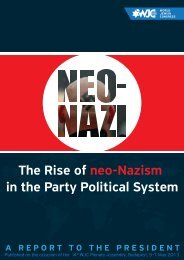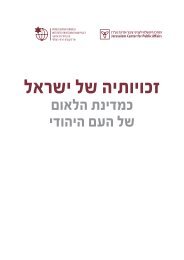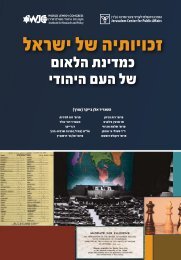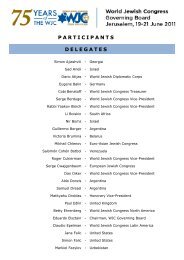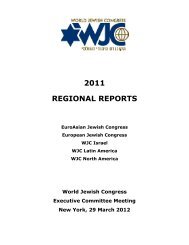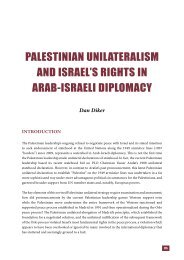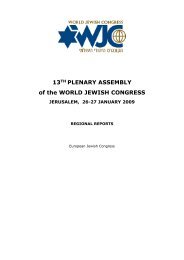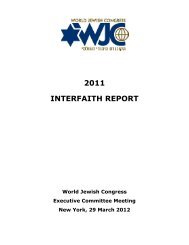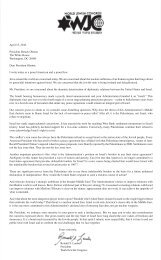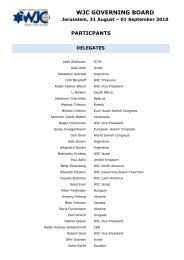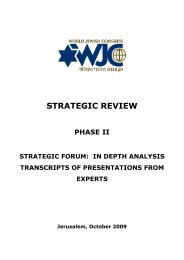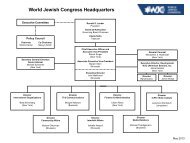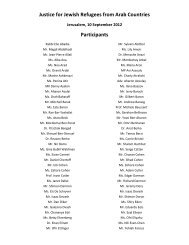Antisemitism Report 2009 - World Jewish Congress
Antisemitism Report 2009 - World Jewish Congress
Antisemitism Report 2009 - World Jewish Congress
Create successful ePaper yourself
Turn your PDF publications into a flip-book with our unique Google optimized e-Paper software.
Another link between the far-right and Muslim Australians was evident when the website<br />
Gold Coast Muslims posted antisemitic material circulated by David Duke, which included<br />
the claim that ―Talmudic prophecies‖ were behind the establishment of Israel, in the midst<br />
of general disinformation about Israel.<br />
It must be emphasised that the <strong>Jewish</strong> and Islamic communities in Australia enjoy a<br />
generally positive relationship and there is little evidence that anti-<strong>Jewish</strong> sentiment is<br />
widespread. At the public, leadership level, Muslim and <strong>Jewish</strong> Australians regularly meet,<br />
and promote understanding and tolerance. Joint declarations supplement stand-alone<br />
condemnations of racism and discrimination. Even in times of high tension, such as in the<br />
wake of comments by a lecturer in Australia as a guest of <strong>Jewish</strong> organisations, that Muslim<br />
migration be selectively capped, the overall relationship remained positive.<br />
The Muslim community includes individuals active in opposing antisemitism, in one or<br />
more of its manifestations. While some organisations, such as the followers of the Gulen<br />
movement, devote energy and resources to interfaith dialogue, others are involved in<br />
educating other Muslims about antisemitism. A good example in the period in review was<br />
the following ―On the web-log Austrolabe, which hosts debates about public affairs matters,<br />
a posting "The Truth about the Truth about the Talmud", in August, addressed one stream of<br />
antisemitism in discourse amongst Muslims. It began with the quotation ―The Jews are<br />
called human beings, but the non-Jews are not humans. They are beasts.‖ and continued "<br />
Heard that before? According to numerous websites, including this Australian Islamic<br />
website, it‘s from the <strong>Jewish</strong> holy book. It forms part of a collection of quotes, reportedly<br />
sourced from <strong>Jewish</strong> religious texts, that are supposed to show a <strong>Jewish</strong> contempt for non-<br />
<strong>Jewish</strong> life. Needless to say, these quotes have been given a good airing in recent weeks on<br />
mailing lists and other forums as some sought to explain the Israeli attack on Lebanon by<br />
referencing <strong>Jewish</strong> sacred texts and associated exegesis. The problem, of course, is that<br />
whilst the quote makes a compelling caption for some anti-Israeli posters, it doesn‘t exist in<br />
the text to which it is referenced. As British blogger Kashif discovers: ' I started off with this<br />
quote, according to the article, found in Baba Mezia 114b. ―The Jews are called human<br />
beings, but the non-Jews are not humans. They are beasts.‖ Hmm… i thought, i can‘t find<br />
that anywhere here. Nevermind, could be a simple mistake; onto the next one: ―Sexual<br />
intercourse between Gentiles is like intercourse between animals‖ in Sanhedrin 74b. Again<br />
searching through the text, i found nothing that even remotely sounded like the above.'<br />
Kashif points to an interesting quote-by-quote discussion of the document which is worth<br />
reading. It seems that all of these supposed quotes are fabricated, mistranslated or taken<br />
grossly out of context. The irony is that these are the very things that Muslims ¬ quite<br />
rightly ¬ complain about. Particularly in discussion of issues such as jihad, the marriage of<br />
the Prophet Muhammad (saw) to Aisha, the status of non-Muslims under Islamic law, or alwala‘<br />
wa‘l bara‘, it is not uncommon for those with an axe to grind to take verses of the<br />
Qu‘ran or hadith out of context or apply to them a meaning that does not exist in the<br />
classical texts. In discussing other religions, we should make sure that we apply the same<br />
standards that we would expect others to apply to our own faith. As Kashif reminds us: The<br />
embarrassment was compounded afterwards when i realised that you could find this article<br />
on Muslim sites. Where is the research from Muslims before sticking this stuff online?<br />
Verifying the authenticity of what we communicate to others is not only part of our religious<br />
heritage (the isnad/chain of narration) but it is also a command from Allah: ―O you who<br />
believe! if an evil-doer comes to you with a report, look carefully into it, lest you harm a<br />
people in ignorance, then be sorry for what you have done.‖ al-Qur‘an 49:6.‖<br />
53



